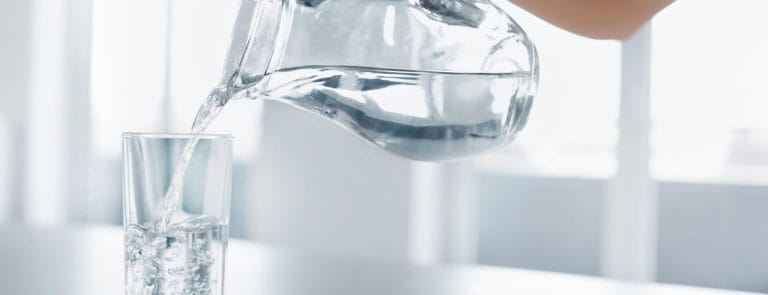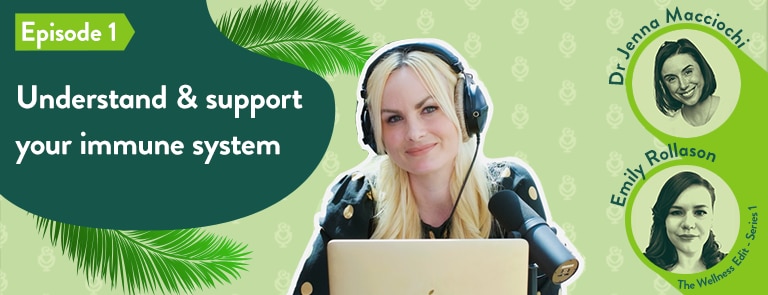10% off £25 OR 15% off £35

Immunity guide: Supporting your immune system
- Health Hub Home
- Conditions
- Immunity
- Immunity guide: Supporting your immune system
What is your immune system? How does it fight disease?
This article will answer all the important questions around immunity, including our top tips to support the immune system and boost your health.
What is your immune system?
You probably only think about your immune system when colds and flu are doing the rounds.
But it is working all the time to guard you against foreign invaders, mounting constant attacks to defend your body without you even noticing.1
It’s a huge, complex network of cells, organs, proteins, and antibodies – known as immunoglobulins – designed to prevent your body from invasion by bacteria, viruses and parasites.
In fact, it saves your life on a daily basis: it’s your immune system that launches an attack when it detects something that shouldn’t be there.
Your immune system also shifts dead or faulty cells out of the body, and, if working correctly, it recognises normal, healthy tissue and leaves it alone.2
Whilst we usually only think of our immune system when we feel ill, it’s actually working every day to keep us safe.3
video to boost your immunity
Meet your immune system’s key players
White blood cells, also called leukocytes, roam your body, monitoring the presence of pathogens – organisms which can give us diseases.
White blood cells are produced and stored in the following organs:4
- lymph nodes, spread throughout the body
- thymus gland, in your neck
- spleen, found above the stomach
- bone marrow
There are two main types of white blood cells:
-
Phagocytes
These break down and eat pathogens. Phagocytes include:
- macrophages – they patrol for foreign bodies and remove waste cells
- neutrophils – these attack bacteria
-
Lymphocytes, or effector cells
Produced in bone marrow, lymphocytes remember previous invaders and mount an attack as soon as they detect their presence again. There are:
- B-cells – these act as lookouts, keeping an eye out for pathogens and sending alerts
- T-cells – they receive signals from B-cells. Helper T-cells coordinate the immune response, while natural killer T-cells destroy infected cells5
Mast cells are a separate group of cells that are important in allergy.
Their job is to heal wounds, but they also release a substance called histamine that can trigger allergy symptoms.
Why is my immune system so important?
Your immune system offers protection against all kinds of infections, allergies and diseases. It looks out for anything harmful that enters your body, picks it up and fights back.
There’s a wide range of things that can spark your immune system into action – an allergen such as pollen, a virus causing a cold, a cut from a fall.
But whatever the problem, your immune system is what’s powering your ability to heal and recover.
When your immune system is in tip-top condition, you probably don’t even notice it working away to protect you around the clock.
However, you will know when there’s something wrong as your immune system is your body’s in-built defence system against illness and infection.
If you feel good today, thank your immune system (and give yourself a pat on the back for looking after it!).
If you have ever wondered what your immune system does and why it is so important then this article should help shed some light.
The immune system basics
The main purpose of your immune system is to protect your body from viruses and bacteria.
Without it, they would have free reign and you would be constantly falling ill.
Your immune system works by recognising the difference between your body’s cells and alien cells, allowing it to destroy any that could be potentially harmful.
This usually works well but can cause problems if your immune system wrongly classifies some of your own cells and attacks them instead.
Why exactly do you need a healthy immune system?
A robust and properly functioning immune system helps you go about daily life as you come into contact with germs and bugs from pets, other people, and your environment.
Without a healthy immune system, you could pick up infections and infectious diseases more easily, and the effects could be serious – even fatal.
Your body’s first line of defence is its physical barriers. If viruses and bacteria manage to break through, there are specialised cells that will jump into action.
Your bloodstream and key areas of your body contain white blood cells that can fight and destroy the viruses and bacteria they find.
Sometimes, our immune system can overreact and even attack your body’s own cells.
This is what happens in the case of allergies like hay fever and autoimmune diseases. It is why donated blood and organs must be very careful matched.
It is easy to take the immune system for granted because it does such a good job at keeping us free from infection around the clock!
If you’ve got a healthy immune system, look after it and it will look after you.
Summary
- We need a healthy immune system to help avoid contracting infections and infectious diseases
- Our immune system is a complex network of cells, organs, proteins, and antibodies that launches an attack when it detects something that shouldn’t be in the body
- White blood cells track down and devour harmful pathogens
What makes up your immune system?
There are several components to the immune system.
Some you will have heard of before but others are more obscure. Here is a brief summary of the different parts and the important roles they play in keeping your body protected:
Skin
The skin is a physical barrier that keeps bacteria and germs at bay. Tears and saliva offer further protection as they’re anti-bacterial so can neutralise any invaders.
Mucus
Anti-bacterial, sticky mucus lines your lungs and this catches germs and stops them from entering your bloodstream.
Mucus is also found in your nasal passage and works in the same way.
Lymph system
Your lymph system carries water, food and oxygen to your cells and removes waste. It is made up of your bone marrow, spleen, thymus and lymph nodes.
In your bone marrow, your body’s disease-fighting white blood cells are produced and released.
There are many different kinds of leukocytes (white blood cells) but they all produce anti-bodies to fight off specific bacteria and viruses.
The main three types are granulocytes, lymphocytes (T-cells and B-cells) and monocytes.
Your spleen regulates how much blood is in your body and removes damaged cells. The thymus gland is where bacteria-fighting T-cells mature.
It’s located behind your breastbone and in the front part of your chest. It’s a vital part of a child’s immune system but is less important in adults.
Lymph nodes are designed to detect any bacteria or infection in cell fluid and remove them. This can cause them to swell temporarily.
Gut
Around seventy to eighty percent of your immune system cells are found in your gut.
It’s often a place where bacteria and viruses attack so it’s important that your gut is in good condition and has plenty of friendly bacteria at its disposal.
What’s the connection between gut health & immunity?
Did you know about 70% of your immune system is within your 9-metre-long digestive system?6
This is partly down to a diverse community of trillions of gut bacteria living in your gastrointestinal (GI) tract.
These microbes not only help with your digestive health, they also influence your overall wellness.
Because your immune system and digestive system are so interconnected, problems in your gut could also make you more susceptible to feeling run down or picking up other illnesses.
It’s not an easy link to get your head around.
But the simplest way to think of it is that a healthy gut supports the immune system by preventing the infiltration of pathogens (or germs) into the body.
A simple breakdown of how gut health and immunity interact
- A healthy digestive tract allows microscopic particles of digested food and nutrients to pass through the gut wall. But with the right balance of bacteria, it can also keep out larger food particles and pathogens.
- If conditions within the GI tract aren’t optimal, the gut wall could be damaged. This allows large food particles and pathogens to escape into the rest of the body.
- When ‘invader’ particles permeate the gut wall, it triggers an immune system response. This includes pain and inflammation in the gut. But it can also affect other parts of the body too.7
Summary
- Our immune system comprises our skin, mucus, lymph system and gut
- 70% of our immune system is within our digestive system
- Gut health is critical to the normal function of our immune system
What can go wrong with your immune system?
Although we often talk about ‘boosting immunity’, in reality it’s more about immune support and supporting your immune system to do its job well, keeping it healthy and balanced.
When it comes to living a healthy and active lifestyle, the immune system is extremely important. Its network of cells and tissues are always looking out for invaders like bacteria, parasites and viruses.
A number of health issues are associated with a poor immune system, including cold sores. This condition is viral and a symptom of the herpes simplex (HS-1) virus.
They usually form around the edge of your lips and are extremely contagious during the ‘shedding’ phase.
Handpicked content: Cold sores: causes, treatment and prevention
They can be passed to other people via kissing and sharing anything from lip balm to using the same cutlery.
Once the first infection has ended, the virus is dormant for the rest of your life and can reappear whenever your body is weak.
However, supporting your immune system can help stop cold sores and other illnesses from coming back so frequently.
Other conditions can involve a problem with your immune system including:
- Allergies – these can develop when your immune system reacts to something harmless – like dust or pollen – as though it’s a pathogen, causing symptoms such as wheezing, itching and a runny nose.8
- Anaphylaxis – this is a severe, life-threatening response to a particular trigger, such as a bee sting or nuts. Symptoms include sudden swelling of your mouth and throat, shortness of breath, hives, nausea and vomiting. Anapyhylaxis is a medical emergency so seek help immediately if you experience these symptoms.9
- Autoimmune disorders – conditions like rheumatoid arthritis, coeliac disease, multiple sclerosis and type 1 diabetes are autoimmune disorders – a result of your immune system confusing normal, healthy cells for pathogens, then attacking and destroying them.10
- Immunodeficiency – this happens when any part of your body’s immune response isn’t working correctly, leaving you exposed to infection. This can happen due to ageing, poor nutrition, alcoholism, obesity or HIV.11
Summary
- The immune system can be challenged by viruses such as cold sores
- As well as allergies, anaphylaxis, auto immune disorders and immunodeficiency
What are the best ways to keep your immune system healthy?
Your immune system is made up of lots of individual parts, which all work together to protect you from infection.
Due to its complexity, even scientists don’t fully understand how it all works, but they do know that following a healthy lifestyle will help support each function of your immune system.
It is vital that your immune system is in good working order if you want to stay as protected as possible. There are several ways you can do this.
You can cut down on the amount of alcohol you drink, start exercising regularly if you don’t already, and try to reduce your stress levels.
If you live a hectic life, simply learning to slow down and rest occasionally can have a big impact.
Here’s an overview with more top tips for how you can support your immune system:12
- Eat a healthy diet with lots of fresh fruit and vegetables and minimise your intake of processed foods
- Get a good night’s sleep
- Exercise regularly
- Maintain a healthy weight
- Reduce stress
- Follow good hygiene practices
- Cut your nails (it may sound like a strange one, but longer fingernails can become a breeding ground for germs)
- Avoid smoking
- Limit your alcohol intake
And there are a few things you can do to stop germs spreading, if you do get ill:
- Cough and sneeze into a tissue and away from other people
- Don’t reuse tissues
- Don’t go into work (and avoid public places, if you can)
- Regularly clean surfaces and door handles around your home
- Wash your hands regularly to minimise the spread of germs
Summary
- Keep your immune system strong by eating healthily, sleeping well, taking regular exercise, maintaining a healthy weight, reducing stress and following good hygiene
Deep dive: Taking care of your immune system
Dr Jenna Macciochi, Immunologist and author of Immunity, The Science of Staying Well, and Holland & Barrett Senior Nutritionist Emily Rollason tell us how:
“Many different factors play a role in our immunity, and no two people’s immune systems are the same”, says Emily Rollason.
“Hereditary factors, environmental impacts, how balanced and nutritious our diet is, hydration status, and lifestyle factors like lack of sleep, stress, smoking and alcohol all impact immunity.”
Get plenty of sleep: if you miss out on sleep, your immune system can’t release enough protective proteins, called cytokines. Your production of antibodies, which fight infection, also declines.13
“Getting a poor night’s sleep can really jeopardise our immune system the next day”, says Dr Macciochi.
“That makes us much more susceptible to picking up germs and it takes us much longer to recover, so it’s important to prioritise sleep. It’s a signal to the immune system that it’s time for rest, whereas in the day it’s more about being on standby.”
Getting enough rest every night can be the difference between staying healthy or not.
If you are struggling to get the right amount of sleep, your immune system will be weakened and be more exposed to common illnesses.
To ensure you get enough rest every night, you need good sleep hygiene. This involves getting into a routine so that your body can optimise the time given to it to recover.
Relaxation CDs, reading a book, yoga or even having a nice long bath are good ways to prepare for sleep.
You should also try to avoid looking at your phone at least 30 minutes before bed, as this can impact your sleep timings.
Handpicked content: 10 tips for a good night’s sleep
How to support the immune system with food
Diet has an important part to play and if you can, you should try to eat some immune-boosting fruits and vegetables every day.
You can take them in liquid form by making juices and smoothies if you’ll find this easier.
“We’re looking for a balanced diet, getting a lot of nutrients from different types of foods”, says Rollason.
“The main nutrient everyone thinks of when we think of immunity is vitamin C, which can be found in fresh fruits and vegetables like bell peppers and oranges.
"Then there’s vitamin A, which is in oily fish, liver, dairy and eggs, but can also be found in apricots and green leafy vegetables.
"You get iron from liver, red meat, beans and nuts, while selenium and zinc can be found in nuts and seeds – zinc particularly in pumpkin seeds, and selenium in Brazil nuts.
"Try to eat lots of wholegrains, some dairy and colourful fruits and vegetables, and remember that different nutrients come from different coloured foods.”
A healthy digestive system is essential to support normal immune system function.
The immune system needs certain nutrients to work effectively and to defend your body against pathogens. So, what gut-friendly foods should you eat?
Superfoods
Mention immunity and diet and ‘superfoods’ instantly come to mind.
This collection of foods earned their heroic label due to the density and richness of their nutrient content.
They’re packed full of vitamins, fibre and antioxidants. Their impressive nutrition credentials offer some important benefits to immunity and your overall health.
Popular superfoods:
- Blueberries
- Kale
- Sweet potatoes
- Beans
- Whole grains
- Nuts
- Salmon
- Acai berries
Probiotics
A healthy digestive system is essential to support normal immune system function.
Did you realise 70% of your immune system is located within your 9-metre-long gastrointestinal tract?14
This is down to the trillions of gut bacteria living there. This diverse and unique community of bacteria is sometimes called a microbiome and it has a big role in supporting your immune system.
Most experts agree, maintaining a healthy balance of essential good bacteria in your gut can have a big influence on your overall wellness.
Probiotics to boost the balance of good bacteria in the gut
Probiotics are well known for aiding digestion problems, such as bloating and constipation, and for helping reduce IBS symptoms.
But what is less recognised, is the role a healthy supply of good bacteria has in supporting immune system function.
Friendly bacteria are important in the formation of a healthy gut wall. This strengthens the barrier that’s protecting your immune system from pathogen invaders.
By helping prevent the growth and proliferation of harmful bacteria in the gut, probiotics are an important way to keep your gut microbiome healthy.15
Probiotics come in the form of live bacteria and yeasts. They are found in certain types of food – for example, cultured dairy products and unpasteurised fermented foods.
They also come in the form of supplements.
Popular probiotic food sources:
- Live yoghurts
- Kefir
- Sauerkraut
- Kimchi
- Pickles
- Tempeh
- Natto
- Miso
- Kombucha
But to get all the probiotic benefits, the good bacteria must be alive when you eat it. So, it’s important that yoghurts are ‘live’ or contain ‘active’ ingredients and choose unpasteurised and fermented versions of these foods.
Prebiotics
Prebiotic foods help to feed a growing population of good probiotic bacteria breeding in your gut. That’s right, if you want probiotics to do their job, you need to nourish them.
Prebiotics are non-digestible food ingredients that can fuel helpful bacteria. They are most commonly found in some fibre-rich foods.
For example, onions, garlic, leek, Jerusalem artichokes, asparagus, bananas and jackfruit are all good prebiotic food stuffs.
If you want probiotics to do their job, you need to nourish them. That’s where the lesser known (but equally important) family of foods called prebiotics comes in.
Prebiotics are non-digestible foods that feed helpful bacteria formed in the gut. So, to make the distinction clear – probiotics introduce new bacteria into your gut and prebiotics fuel the bacteria already in your gut.
Together they’re a highly compatible duo. Prebiotics are most commonly found in fibre-rich foods.
Popular prebiotic food sources:
- Onions
- Garlic
- Leek
- Jerusalem artichokes
- Asparagus
- Bananas
High fibre foods
Fibre helps to keep your digestive system healthy by encouraging regular bowel movement. It’s also a good source of prebiotics for the good bacteria in your gut to feed off.
However, it’s important not to go overboard with your fibre consumption as this can lead to negative effects on your gut health. The NHS advises a daily intake of around 30g.17
Whole grains, fruit, vegetables, nuts and seeds are all good natural food sources.
What foods are high in fibre?
What foods are high in fibre?
Here's how to get your daily 30g of fibre.
Read more


List of the best foods to support your immune system
Whilst eating a healthy, balanced diet is vital in supporting your immune health, there are several foods that are thought to give it that extra little kick.18
-
Citrus fruits
Citrus fruits are great for vitamin C, which can help to fight off infections.
Vitamin C can’t be stored by your body, so you need to try and incorporate foods that are rich in vitamin C every day. Try oranges, lemons and limes.
-
Watermelon
Watermelon contains citrulline, which helps keep your heart healthy, and they’re rich in vitamins A, C and B6 too.
Their red flesh supplies your body with lycopene, which helps keep your immune system balanced.
-
Broccoli
When it comes to choosing your five-a-day, make sure broccoli becomes a firm favourite as it’s bursting with nutrients like vitamins A, C and E and contains choline which is good for your gut.
Instead of cooking your broccoli, try to eat it raw if you can, as it’s more nutritious this way.
Similar vegetables that are classed as superfoods when it comes to your immune system include sprouts, kale and cauliflower.
-
Chicken
Zinc is needed for white blood cell production so your body can fight off infection and for healthy skin, hair and nails.
As well as chicken, zinc can be found in seafood (like oysters), eggs, chickpeas, mushrooms, pumpkin seeds, sunflower seeds and cashew nuts, so eat these more regularly.
-
Garlic
Raw garlic is brilliant at giving your body’s immune system a helping hand.
It has natural antibacterial and anti-inflammatory properties, helping you ward off illness and recover quicker.
Raw garlic can increase the number of t-cells in your blood, which in turn fight viruses.
Crush or slice garlic cloves and add to salad dressings as garlic’s health powers are best when it’s raw.
-
Yoghurt
Instead of pouring milk on your cereal in the morning, why not add a dollop of yoghurt?
You need to choose a yoghurt that contains live cultures or ‘friendly bacteria’ as these help your immune system fight against bad bacteria in the gut.
They can also encourage your body to produce more white blood cells.
Handpicked content: Three amazing new ways to make the most of yoghurt
-
Mushrooms
Mushrooms are an interesting food ingredient, because – just like us – they synthesise Vitamin D when they are exposed to UV light.
You should therefore choose wild mushrooms or mushrooms grown in UV light. They are the only plant source of vitamin D, which supports your immune system.
-
Bell peppers
Bell peppers contain lots of vitamin A, which can help repair your body’s mucosal barriers (easily damaged by infection).
-
Chillies
Fresh red and green chillies are incredible health boosters.
They contain lots of vitamin A and C (nutrients which can support the immune system) and capsaicin which can help clear congestion and phlegm.
Top Tip
When you go shopping, the easiest way is to pick a wide range of fruits and vegetables that are lots of different colours. Not only will your plate look more tempting, but you’ll be getting all your immune-supporting nutrients as well.
How much water should I be drinking each day?
How much water should I be drinking each day?
We’ve all heard that we should drink eight glasses of water a day, but is there any truth to this? We took a closer look to separate the myths from the fact.
Read more


Increase your fluid intake
Proper hydration is crucial to good gut health and supporting a stronger immune system.
For example, increasing fibre and not increasing water intake can worsen constipation. This is because water helps fibre to pass through the digestive tract.
The NHS Eatwell Guide recommends 6 to 8 glasses of fluid a day as a guide.18
Handpicked content: How much water should I be drinking each day?
This more collaborative relationship between the digestive and the immune systems, is a relatively new discovery in the last decade.
Although studies are now uncovering more about this connection, there’s a lot more to uncover.
But with so much of the immune system located in the gut, there seems to be little doubt that what we eat can have an influence on our overall wellness, as well as digestive health.19
Summary
- Foods which support the immune system include fresh fruit and vegetables
- Superfoods, probiotics and prebiotics play a key role in keeping the immune system healthy
- Keeping hydrated is also vital
The best vitamins and minerals for your immune system
“Between October and April the sun isn’t strong enough for us to synthesise our own vitamin D, so we need to take around 10 micrograms a day”, says Rollason.
“Nuts and seeds tend to be the main plant-based source of minerals but B12 is difficult to get, so if you’re fully vegan you can take a supplement, or get it from things like nutritional yeast and supplemented plant-based milk. Choose one with added iodine, too.”
There are a few key vitamins and minerals that are known to help support your immune system.20
If you eat a healthy, varied diet with lots of fruits and vegetables, you should be able to get all the nutrients you need.
A 2018 study in Nutrients reported that deficiencies in certain key nutrients can dampen immunity, particularly:
-
Vitamin A
Vitamin A supports the normal functioning of the immune system as it’s thought to help develop a type of white blood cell that produces antibodies.
Some sources of vitamin A include eggs, dark green leafy vegetables and cod liver oil.
-
Vitamin C
Vitamin C can help support cellular functions needed by the immune system.
Oranges, orange juice, broccoli, tomatoes, strawberries and red/green peppers are your best source.
-
Vitamin D
Vitamin D will help to keep your immune system strong, with the ability to fight off infections quickly.
As most vitamin D is received from sunlight, the UK Government recommends a daily supplement between October and March.
-
Zinc
Zinc contributes to the normal function of the immune system and can be found in seafood, red meat, chickpeas, eggs, pumpkin and sunflower seeds.
Be careful not to consume more than the recommended daily allowance, which is 25mg.
Handpicked content: A guide to zinc & your immune system
-
Vitamin E
Vitamin E is important for strong immune function and helps maintain healthy skin and eyes.
It’s also an antioxidant, so it protects the body from damage due to free radicals (oxidation).
Plant oils, like olive oil, are a rich source of vitamin E. Soya, nuts and cereal are good sources too.
-
Vitamin B12
Vitamin B12 is needed to help your body convert food into energy.
Vitamin B12 is only naturally found in animal products such as meat and dairy, so vegans and vegetarians are at risk of low intakes.
Handpicked content: 34 top foods & sources of vitamin B12
-
Folic acid
Folic acid is a water-soluble vitamin used by the body to help form red blood cells, to support your immune system, and is essential for a baby’s healthy development during pregnancy.
-
Iron
Iron is needed for making haemoglobin, a protein found in red blood cells that helps transport oxygen around the body.
It plays a key role in supporting the immune system, too.
Handpicked content: Iron in multivitamins - what you need to know
-
Selenium
Selenium is an antioxidant, which means it helps protect our cells and tissues from damage caused by an excess of free radicals, caused by smoking or pollution, for example.
If you feel you’re missing any of these nutrients in your diet, it may be a good idea to take a multivitamin.21
8 of the best vitamins to support your immunity
8 of the best vitamins to support your immunity
Find out which vitamins are best & 8 of the best vitamin formulas to support your immunity.
Read more


How to support the immune system with supplements
For the immune system to hit peak performance, it needs good, regular nourishment.
So, it’s understandable that eating a diet lacking in essential nutrients is connected with a higher risk of getting some health conditions.
If your diet isn’t providing you with the micronutrients you need, supplements, such as multivitamins, offer additional support to your immune system.
Handpicked content: How to choose the best multivitamin for you
This also applies to probiotics and prebiotics. Is your gut getting sufficient supplies of these nutrients from your diet?
If not, adding a probiotic or prebiotic supplement can help to bolster your gut microbiome. This offers extra benefits to your immunity too.
How relieving stress can help your immune system
A 2014 study by Stanford University, USA found chronic stress can suppress your immune system’s protective effects.
It can also trigger the type of immune over-reaction associated with the development of auto-immune diseases.22
Make time to unwind every day, for example with yoga, walking or meditation.
“Stress might feel psychological, but it has a biological effect”, says Dr Macciochi.
“It’s designed to motivate us to get away from danger, so it switches off our immune system, because it’s quite energetically costly.
"Stress might also result in us engaging in poor behaviours, so we may sleep worse, and eat worse, and that trickle-down effect can also impact our immune system.
"But we need to not always see stress as negative – it’s designed to motivate us.
"There are many different stress-reducing techniques, from journaling to meditation to simply walking or checking in with friends, you just have to find the tools that work for you.”
Summary
- Vitamins and nutrients can also play an important role in good immunity
- Key vitamins include: vitamin A, vitamin C, vitamin D, vitamin E, vitamin B12, folic acid, iron, selenium, zinc
- Managing stress is also beneficial for the immune system
How exercise helps your immune system
Being active helps strengthen your immune system.
Establishing an exercise routine can do your body a world of good. It not only keeps you mentally and physically sharp, but it can really benefit your immune system too.
“Moving our bodies – even just by getting out for a walk – moves the lymphatic fluid around the body”, says Dr Macciochi.
“This is the circulatory system of your immune system, so where the heart pumps your blood around, the lymphatic system is reliant on your muscles to move immune cells around the body and perform a surveillance function, looking out for anything untoward.
"That’s why it’s important to break up sedentary periods by getting up and moving around, keeping that lymph fluid flowing.”
Regular exercise is thought to increase overall fitness, which may improve immune system function.
It may also lower levels of inflammatory cytokines that may play a role in heart disease.
Scientists aren’t sure why, but theories include:23
- the rise in body temperature during a workout helps kill bacteria, leaving you better able to fight infection
- exercise may help flush bacteria out of the airways
- being active reduces stress hormones, which can suppress immunity
And while extreme endurance exercise – such as intensive gym work or training for a marathon – may temporarily suppress the immune system, leaving you more exposed to catching a bug, it does have a plus side.
A 2017 study by Shanghai University of Sport found that during high-intensity training the immune system can actually produce an anti-inflammatory effect – reducing our risk of cardiovascular conditions in later life.24
Some recommended exercises include:
- Walking 20-30 minutes every day
- Going to the gym 3-4 times a week
- Enjoying a game of golf regularly
Exercise should always be included as part of a healthy lifestyle, but consult your healthcare professional before changing your current activity levels.
Summary
- Regular exercise and reducing stress levels can help boost your immune system
Myths about the immune system
There are some rumours floating around about the immune system that we thought we'd explore.
-
Everyone is born with the same healthy immune system
Unfortunately, this isn’t true. If you have a healthy immune system, count yourself lucky (and look after it!).
Some people are born with primary immunodeficiency disease. This affects the body’s ability to defend itself against infection from bacteria, parasites, and viruses.
There are more than 100 known congenital immunodeficiency disorders, including alymphocytosis, XLA (X-linked agammaglobulinemia) and CVID (common variable immunodeficiency).
-
A healthy immune system can’t be damaged
Not true.
If you are born with a healthy, normal immune system, episodes during your life can change it. In fact, acquired immune system disorders are more common that congenital ones.
If an outside source (like an infection or a toxic chemical) attacks your body, it can cause lasting damage to your immune system.
Diabetes and malnutrition are among the list of things which can change a person’s immune system throughout life.
So don’t take a healthy immune system for granted- do everything you can to protect it, so it can continue to protect you.
-
Antibiotics help your immune system fight diseases
You’d think that antibiotics and your immune system are on the same team, right?
While they both want to get you healthy, antibiotic use can actually weaken your immune system.
Antibiotics don’t actually interact with the cells of the immune system, so they don’t directly affect it.
But unnecessary antibiotic use stops your natural immune system from being challenged, causing it to slow down regulation and get weaker.
The solution? Only take antibiotics when you absolutely have to, and take measures to build up your gut bacteria and immune system afterwards.
-
Your immune system will stay the same throughout your life
This might surprise you, but your immune system ages just like you do. Your immune system gets older just like every cell and system in your body does.
Your body’s ability to fight infection gets weaker and this double-whammy can leave older people more prone to illness.
Keep your immune system healthy as you get older by getting enough exercise, managing daily stress, and eating a healthy diet with plenty of fruit and vegetables.
Supporting your immune system whatever your age
We’re all born with an immune system but not every baby’s immune system is healthy and functions as it should. Some babies and young children can be more prone to picking up bugs, especially when they start nursery or school.
A healthy diet, physical activity, good hygiene and sleeping habits can all help support a child’s immune system.
Handpicked content: 10 of the best vitamins for kids
Everyone’s immune system changes throughout their life. As you get older, your immune response starts to decline, which means you’re more susceptible to infection.25
Good nutrition and some levels of physical activity become even more important for elderly people, to ensure their immune system remains in good working order.
Understand and support your immune system
Immunity. It’s more important now than ever. Yet many of us don’t understand our immune system or know how to look after it. In this episode, our host Dr Gemma Newman, we’ll be discussing:
- Understanding what immunity is
- The basics of immune system maintenance
- Everyday tips for immunity support.


Last updated: 14 June 2022
- https://www.medicalnewstoday.com/articles/320101.php
- https://www.medicalnewstoday.com/articles/320101.php
- http://www.imgt.org/IMGTeducation/Tutorials/ImmuneSystem/UK/the_immune_system.pdf
- https://www.medicalnewstoday.com/articles/320101.php
- https://www.medicalnewstoday.com/articles/320101.php
- https://www.ncbi.nlm.nih.gov/pmc/articles/PMC2515351
- https://provenprobiotics.co.uk/your-gut-as-your-immune-system/
- https://www.hopkinsmedicine.org/healthlibrary/conditions/allergy_and_asthma/allergies_and_the_immune_system_85,P00039
- https://www.hopkinsmedicine.org/healthlibrary/conditions/allergy_and_asthma/allergies_and_the_immune_system_85,P00039
- https://medlineplus.gov/ency/article/000816.htm
- https://www.immunology.org/policy-and-public-affairs/briefings-and-position-statements/immunodeficiency
- https://symptoms.webmd.com/cold-flu-map/keep-immune-system-healthy
- https://www.mayoclinic.org/diseases-conditions/insomnia/expert-answers/lack-of-sleep/faq-20057757
- https://www.ncbi.nlm.nih.gov/pmc/articles/PMC2515351
- https://provenprobiotics.co.uk/your-gut-as-your-immune-system/
- https://www.nhs.uk/live-well/eat-well/how-to-get-more-fibre-into-your-diet/
- https://www.healthline.com/health/food-nutrition/foods-that-boost-the-immune-system#yogurt
- https://www.nhs.uk/live-well/eat-well/the-eatwell-guide/
- https://www.newsweek.com/gut-bacteria-immune-system-probiotics-1333541
- https://health.clevelandclinic.org/eat-these-foods-to-boost-your-immune-system/
- https://www.ncbi.nlm.nih.gov/pmc/articles/PMC6212925/
- https://www.ncbi.nlm.nih.gov/pubmed/24798553
- https://medlineplus.gov/ency/article/007165.htm
- https://www.ncbi.nlm.nih.gov/pmc/articles/PMC5216585/
- https://www.ncbi.nlm.nih.gov/pmc/articles/PMC3582124/

Nutritionist
Joined Holland & Barrett: January 2018
Bsc in Nutrition, Registered Associate Nutritionist and Certification in Pre and Post Natal Nutrition
Donia started her career as a freelance nutritionist, later she joined Nestle as their Market Nutritionist to help support their healthier product range, before joining the team at Holland & Barrett in January 2018.
Donia has over 6 years experience as a Nutritionist and also works with clients on a one to one basis to support their goals which include weight loss, prenatal and postnatal nutrition and children’s health.


